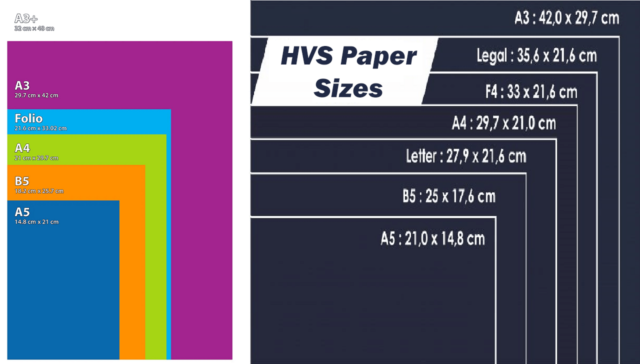HVS paper has become the most popular type of paper among students and office workers. It is widely used for creating reports, college assignments, and various other daily tasks. However, many of us may not actually know what HVS paper really is or what sizes it comes in. We often use it without truly understanding it. Before diving into the main discussion, it’s useful to first understand what HVS paper actually is.
What is HVS Paper?
HVS stands for “Houtvrij Schrijfpapier,” a Dutch term meaning “wood-free writing paper.” HVS paper is a high-quality paper made from well-processed wood pulp. One of its main characteristics is its smooth texture and flat surface, making it ideal for printing clear text and images.
HVS paper is also known for its durability and resistance to aging, which makes it a popular choice for long-lasting documents. It’s no surprise, then, that this paper is commonly found in stores and widely used. The price of HVS paper varies depending on its size and quality.
Types of HVS Paper
There are several types of HVS paper, categorized by color and use:
- White HVS: This is the most common and widely used type. It’s typically used for everyday printing, letters, and general document applications.
- Colored HVS: Available in various colors such as cream, yellow, blue, and more. Colored HVS is often used to add visual variety to documents or for design purposes.
- Watermarked HVS: This paper contains embedded images or text, commonly used for official documents or valuable correspondence.
- Coated HVS: With an extra coating, this type is thicker and ideal for color printing. It’s often used for brochures, pamphlets, or other marketing materials.
HVS Paper Sizes
Below are explanations of the different sizes of HVS paper based on standard series classifications. Common sizes of HVS paper include A3, B5, B3, Folio or F4, and Quarto or A3. These sizes are chosen according to their use. For example, students frequently use A4 or F3 sizes. In international standards, HVS paper sizes are divided into the A, B, C, F, and R series.
There are many size options available to suit different paper usage needs. This becomes especially important when printing documents that must meet specific size requirements.
Why is this important? Because knowing the correct paper size is essential for printing documents with the desired results.
If you are still unsure about which paper size to choose, you can refer to the table below.
| Type of HVS Paper | Millimeters (mm) | Centimeters (cm) | Inches (in) |
| A3 | 297 x 420 | 29.7 x 42.0 | 11.69 x 16.54 |
| A4 | 210 x 297 | 21.0 x 29.7 | 8.27 x 11.69 |
| A5 | 148 x 210 | 14.8 x 21.0 | 5.83 x 8.27 |
| B5 | 176 x 250 | 17.6 x 25 | 6.93 x 9.84 |
| F4 or Folio | 216 x 330 | 21.6 x 33 | 8.5 x 13 |
| Letter or Quarto | 216 x 279 | 21.6 x 27.9 | 8.5 x 11 |
| Legal | 216 x 356 | 21.6 x 35.6 | 8.5 x 14 |
After reviewing the table above, do you now recognize the commonly used HVS paper sizes? This table will help you remember the paper sizes you may need for printing.
From the table, there is a noticeable difference between the F4 and Legal sizes. If you print a document in F4 size while your printer is set to Legal, the printed result will not match properly, and some of the text may be cut off.
A Series HVS Paper Sizes
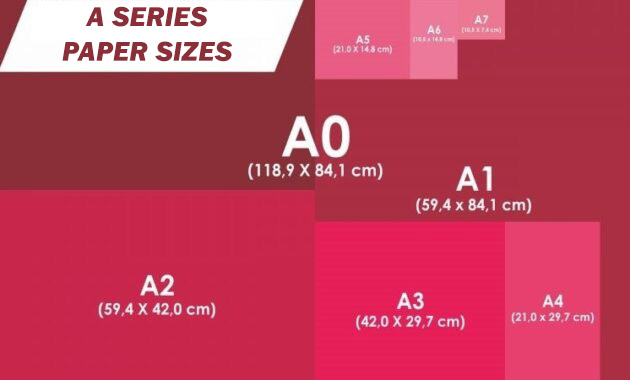
Paper sizes in the A series are international standards commonly used in publishing, offices, and printing. Some examples of paper sizes in the A series include:
| Paper Format | Millimeters (mm) | Centimeters (cm) | Inches (in) |
| A0 | 841 x 1189 | 84.1 x 118.9 | 33.11 x 46.81 |
| A1 | 594 x 841 | 59.4 x 84.1 | 23.39 x 33.11 |
| A2 | 420 x 594 | 42.0 x 59.4 | 16.54 x 23.39 |
| A3 | 297 x 420 | 29.7 x 42.0 | 11.69 x 16.54 |
| A4 | 210 x 297 | 21.0 x 29.7 | 8.27 x 11.69 |
| A5 | 148 x 210 | 14.8 x 21.0 | 5.83 x 8.27 |
| A6 | 105 x 148 | 10.5 x 14.8 | 4.13 x 5.83 |
| A7 | 74 x 105 | 7.4 x 10.5 | 2.91 x 4.13 |
| A8 | 52 x 74 | 5.2 x 7.4 | 2.05 x 2.91 |
| A9 | 37 x 52 | 3.7 x 5.2 | 1.46 x 2.05 |
| A10 | 26 x 37 | 2.6 x 3.7 | 1.02 x 1.46 |
B Series HVS Paper Sizes
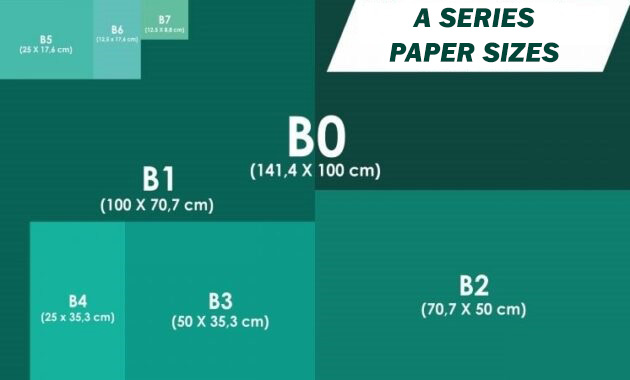
B series paper is commonly used for printing wall art or posters. The dimensions of B series paper are generally twice the size of those in the A series.
Below is a table showing various paper sizes in the B series.
| Paper Format | Millimeters (mm) | Centimeters (cm) | Inches (in) |
| B0 | 1000 X 1414 | 100 X 141.4 | 39.37 X 55.67 |
| B1 | 707 x 1000 | 70.7 x 100 | 27.83 x 39.37 |
| B2 | 500 x 707 | 50 x 70.7 | 19.69 x 27.83 |
| B3 | 353 x 500 | 35.3 x 50 | 13.90 x 19.69 |
| B4 | 250 x 353 | 25 x 35.3 | 9.84 x 13.90 |
| B5 | 176 x 250 | 17.6 x 25 | 6.93 x 9.84 |
| B6 | 125 x 176 | 12.5 x 17.6 | 4.92 x 6.93 |
| B7 | 88 x 125 | 8.8 x 12.5 | 3.46 x 4.92 |
| B8 | 62 x 88 | 6.2 x 8.8 | 2.44 x 3.46 |
| B9 | 44 x 62 | 4.4 x 6.2 | 1.73 x 2.44 |
| B10 | 31 x 44 | 3.1 x 4.4 | 1.22 x 1.73 |
C Series HVS Paper Sizes
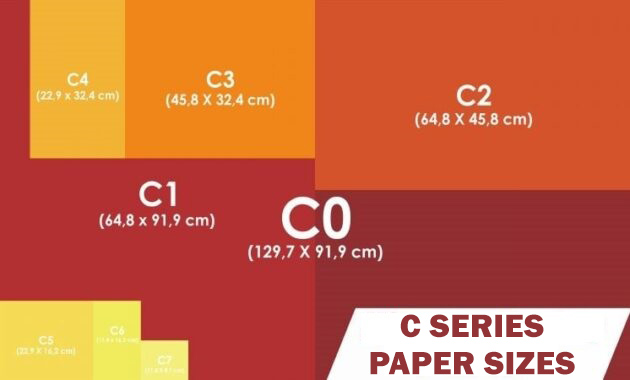
C series paper sizes are typically used for making postcards, folders, and envelopes. The area of one sheet of C series paper is approximately the geometric mean between the corresponding A and B series sheets.
For example, a C3 sheet has an area roughly equal to the average of an A3 and a B3 sheet combined and then divided by two. In other words, C series paper sizes are slightly larger than both A and B series of the same number.
Below is a table displaying various C series paper sizes:
| Paper Format | Millimeters (mm) | Centimeters (cm) | Inches (in) |
| C0 | 919 x 1297 | 91.9 x 129.7 | 36.10 x 51.06 |
| C1 | 648 x 919 | 64.8 x 91.9 | 25.51 x 36.10 |
| C2 | 458 x 648 | 45.8 x 64.8 | 18.03 x 25.51 |
| C3 | 324 x 458 | 32.4 x 45.8 | 12.76 x 18.03 |
| C4 | 229 x 324 | 22.9 x 32.4 | 9.02 x 12.76 |
| C5 | 162 x 229 | 16.2 x 22.9 | 6.38 x 9.02 |
| C6 | 114 x 162 | 11.4 x 16.2 | 4.49 x 6.38 |
| C7 | 81 x 114 | 8.1 x 11.4 | 3.19 x 4.49 |
| C8 | 57 x 81 | 5.7 x 8.1 | 2.24 x 3.19 |
| C9 | 40 x 57 | 4 x 5.7 | 1.57 x 2.24 |
| C10 | 28 x 40 | 2.8 x 4 | 1.10 x 1.57 |
F Series Paper Sizes
F series paper sizes are often referred to as folio paper, with the common size being 215 x 330 mm or 8.5 x 13 inches. This paper is typically used in photocopy centers and office environments.
Folio paper has a long history and was one of the traditional paper sizes used in Europe and the British Commonwealth. However, over time, it has gradually been replaced by the A series paper sizes, which have become the international standard, as previously explained.
Below is a table displaying various F series paper sizes:
| Paper Format | Millimeters (mm) | Centimeters (cm) | Inches (in) |
| F0 | 841 x 1321 | 84.1 x 132.1 | 33.1 x 52 |
| F1 | 660 x 841 | 66 x 84.1 | 26 x 33.1 |
| F2 | 420 x 660 | 42 x 66 | 16.5 x 26 |
| F3 | 330 x 420 | 33 x 42 | 13 x 16.5 |
| F4 | 210 x 330 | 21 x 33 | 8.3 x 13 |
| F5 | 165 x 210 | 16.5 x 21 | 6.5 x 8.3 |
| F6 | 105 x 165 | 10.5 x 16.5 | 4.1 x 6.5 |
| F7 | 82 x 105 | 8.2 x 10.5 | 3.2 x 4.1 |
| F8 | 52 x 82 | 5.2 x 8.2 | 2 x 3.2 |
| F9 | 41 x 52 | 4.1 x 5.2 | 1.6 x 2 |
| F10 | 26 x 41 | 2.6 x 4.1 | 1 x 1.6 |
R Series Paper Sizes
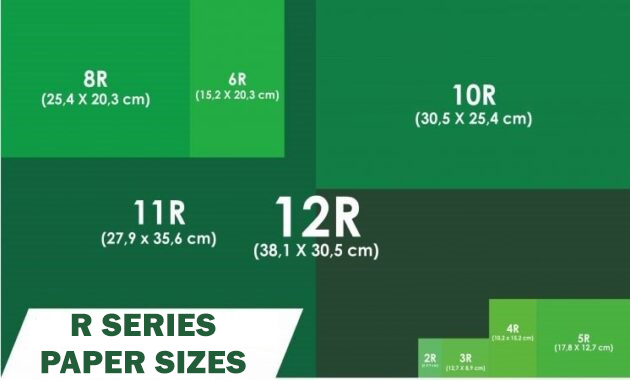
R series paper is commonly used for printing photographs that are later placed in photo frames. Standard sizes that are frequently used include 4R, 5R, 10R, and 12R.
There are various types of paper suitable for photo printing, such as glossy, inkjet, matte, and many others. In addition to the paper type, the choice of printer used to produce the prints can also impact the final output quality of the photos.
Below is a table displaying the different sizes of R series paper:
| Paper Format | Millimeters (mm) | Centimeters (cm) | Inches (in) |
| 2R | 60 X 90 | 6 X 9 | 2.36 X 3.54 |
| 3R | 89 x 127 | 8.9 x 12.7 | 3.5 x 5 |
| 4R | 102 x 152 | 10.2 x 15.2 | 4 x 6 |
| 5R | 127 x 178 | 12.7 x 17.8 | 5 x 7 |
| 6R | 152 x 203 | 15.2 x 20.3 | 6 x 8 |
| 8R | 203 x 254 | 20.3 x 25.4 | 8 x 10 |
| 10R | 254 x 305 | 25.4 x 30.5 | 10 x 12 |
| 11R | 279 x 356 | 27.9 x 35.6 | 11 x 14 |
| 12R | 305x 381 | 30.5 x 38.1 | 12 x 15 |
| 14R | 284 x 353 | 28.4 x 35.3 | 11.18 x 13.90 |
| 17R | 305 x 405 | 30.5 x 40.5 | 12 x 15.59 |
| 19R | 305 x 455 | 30.5 x 45.5 | 12 x 17.92 |
ANSI Paper Sizes
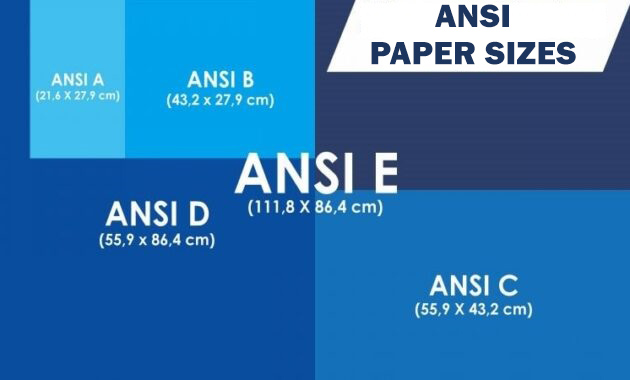
The ANSI size standard refers to ANSI/ASME Y14.1, which defines paper dimensions based on the letter-size format commonly known as 8.5 x 11 inches.
In the table below, you will find the standard ANSI paper sizes measured in millimeters (mm), centimeters (cm), and inches (in):
| Paper Format | Millimeters (mm) | Centimeters (cm) | Inches (in) |
| ANSI A | 216 x 279 | 21.6 x 27.9 | 8.5 x 11 |
| ANSI B | 432 x 279 | 43.2 x 27.9 | 17 x 11 |
| ANSI C | 432 x 559 | 43.2 x 55.9 | 17 x 22 |
| ANSI D | 559 x 864 | 55.9 x 86.4 | 22 x 34 |
| ANSI E | 864 x 1118 | 86.4 x 111.8 | 34 x 44 |
American Paper Sizes
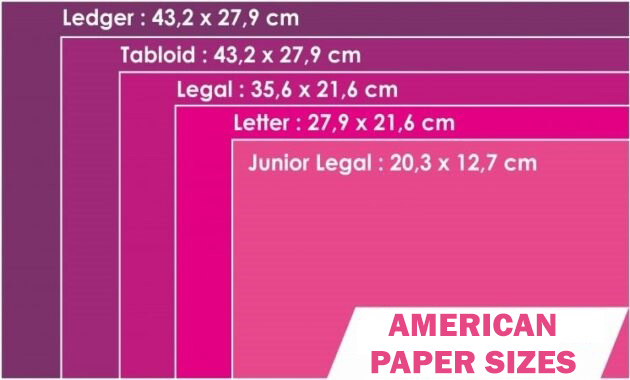
These paper sizes are commonly used by individuals living in North America and Mexico in their daily activities.
Below is a list of these paper sizes:
| Paper Format | Millimeters (mm) | Centimeters (cm) | Inches (in) |
| Junior Legal | 203 x 127 | 20.3 x 12.7 | 8 x 5 |
| Legal | 216 x 356 | 21.6 x 35.6 | 8.5 x 14 |
| Letter | 216 x 279 | 21.6 x 27.9 | 8.5 x 11 |
| Tabloid | 279 x 432 | 27.9 x 43.2 | 11 x 17 |
| Ledger | 432 x 279 | 43.2 x 27.9 | 17 x 11 |
HVS Paper Thickness
In addition to paper size, it’s also important to consider the thickness of HVS paper before using it. HVS paper comes in different thicknesses, and naturally, its applications vary according to those differences.
HVS paper thickness can generally be categorized into the following:
- 70 gsm: HVS paper with a thickness of 70 gsm is commonly used for photocopying or printing standard documents.
- 75 gsm: HVS paper at 75 gsm is typically used for printing and photocopying regular documents.
- 80 gsm: This thickness is suitable for printing important documents, such as office files or academic papers.
- 100 gsm: HVS paper with 100 gsm thickness is often used for presentations where detailed images and high print quality are required.
Commonly Used HVS Paper Sizes
As previously mentioned, HVS paper is widely used in offices, especially in large-scale business environments. This paper has a slightly rough texture, which helps ink from printers absorb more effectively.
HVS paper comes in various sizes tailored to different needs. The most commonly used sizes in Indonesia range from A5, B5, A4, Letter (Q4), Folio (F4), to A3, all of which are widely available at stationery and office supply stores.
For further reference, below is a table listing the most commonly used HVS paper sizes:
General HVS Paper Size Chart
| Paper Size Name | Centimeters | Inches |
| A5 | 14.8 x 21 | 5 5⁄6 × 8 1⁄4 |
| B5 | 18.2 x 25.7 | 7 1⁄6 × 10 1⁄8 |
| A4 | 21 x 29.7 | 8 1⁄4 × 11 17⁄24 |
| Letter (Quarto) | 21.6 x 27.9 | 8 1⁄2 × 11 |
| F4 (Folio) | 21 x 33 | 8 1⁄4 × 13 |
| A3 | 29.7 x 42 | 11 17⁄24 × 16 13⁄24 |
Please note: In Microsoft Office, the Legal size is different from Folio. The Legal size measures 21.6 cm x 35.6 cm. If you want to use Folio paper, it is recommended to select the custom size option in Microsoft Office.
Below are several types of HVS (Houtvrij Schrijfpapier) paper sizes that are commonly available across.
1. A5 HVS Paper
A5 paper generally has three different size measurements: in millimeters (145 x 210), centimeters (14.8 x 21.0), and inches (5.83 x 8.27). While these sizes may appear similar at first glance, the differences become quite noticeable when designing using software like CorelDRAW or Adobe Illustrator.
A5 paper is commonly used in various office settings and serves multiple purposes. Due to its relatively small size, A5 paper is ideal for creating restaurant or café menus, party invitations, as well as brochures or flyers. In the book publishing world, A5 paper is also used to print novels, short stories, and other literary works. However, in some cases, yellow A5 paper is preferred over white paper as it tends to be easier on the eyes when reading.
2. A4 HVS Paper
Compared to A5, A4 paper is far more commonly used in offices. A4 paper typically comes in three different size measurements: in millimeters (210 x 297), centimeters (21.0 x 29.7), and inches (8.27 x 11.69). Aside from HVS, other types of A4 paper include buffalo, folio, quarto, plano, and even polaroid paper.
Although many types of A4 paper are available, HVS remains the most affordable in terms of price. A4 paper serves a wide variety of purposes, including printing documents, writing office assignments, creating schedules, sketching drafts, and more.
Due to its high versatility, the use of A4 paper is not limited to office environments. It is also widely used in schools, universities, and various other institutions.
3. A3 HVS Paper
A3 HVS paper typically has a relatively thin texture, with a thickness ranging from 60 to 100 gsm. In many offices, this paper is used for creating work reports, as a medium for printing flyers, and also for drawing purposes, although its use for drawing is less common.
A3 paper comes in three size formats: in millimeters (297 x 420), centimeters (29.7 x 42.0), and inches (11.69 x 16.54). Aside from HVS, A3 paper is also available in other types such as art paper, chromo sticker, linen, fancy, and ivory.
Compared to A4 and A5 paper, A3 is significantly larger and therefore less commonly used. It is mostly utilized by civil engineering and architecture students for building design assignments.
4. A2 HVS Paper
In terms of size, A2 paper is smaller than A1 and A0. However, its use is relatively rare when compared to A4 and A5 paper, especially in office environments. Typically, A2 paper is used for printing large-sized photos, posters, or maps, and is rarely used for other purposes.
In the market, aside from HVS, A2 paper also comes in ivory and duplex types. All three share the same dimensions: in millimeters (420 x 594), centimeters (42.0 x 59.4), and inches (16.54 x 23.39).
Before purchasing, it’s important to ensure the paper is still sealed (new stock) to maintain its ink absorption quality when used with printing machines.
5. A6 HVS Paper
Although small in size, A6 paper still has many practical uses. You can use it for creating shopping notes, jotting down ideas from brainstorming sessions, or making small flyers. Additionally, this paper is great for writing memos with special messages. For example, if you’re assigned a task that requires you to travel out of town while no other staff are present in the office.
Even though A6 and A2 HVS paper are rarely used, it is still advisable to keep a supply at the office. They may come in handy when the need arises unexpectedly.
Conclusion
By now, you likely have a better understanding of HVS paper sizes, their types, and their various applications. When choosing HVS paper for your work, make sure to consider the type and size that best suit your needs. HVS paper is an excellent choice for a wide range of purposes thanks to its high quality and versatility. We hope this information helps you better understand the ins and outs of HVS paper. See you in the next article!

